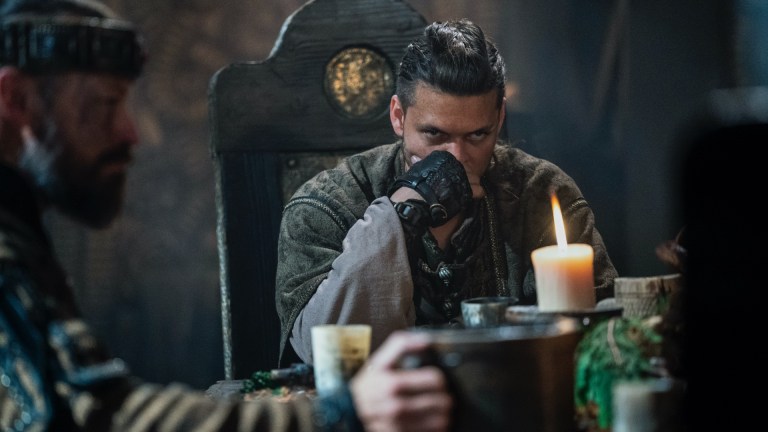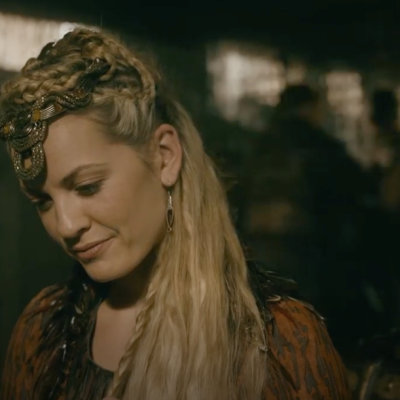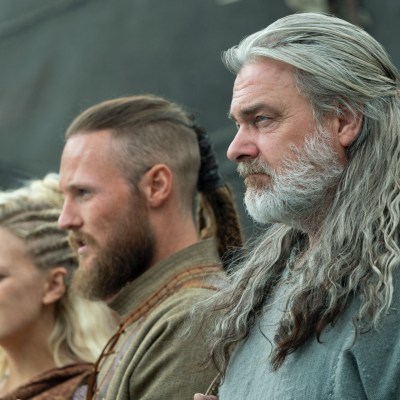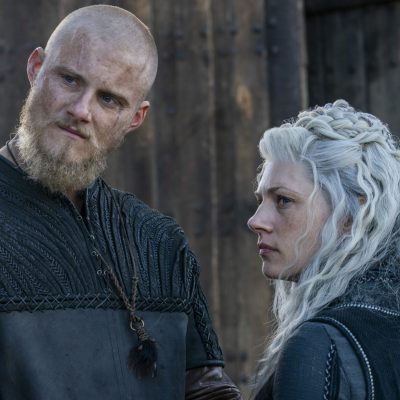Vikings Ending Explained
History's sprawling epic Vikings comes to an end with a final batch of episodes on Amazon Prime. Find out exactly what that ending means for the series here.

The following contains spoilers for Vikings season 6 part two.
Vikings has always been concerned with legacy: that of the Vikings themselves, and of Ragnar and his sons. It’s clear from the show’s coda – Ubbe and Floki side by side on a distant beach, contemplating existence as the sun glows down upon the endless stretch of ocean before them – that the two ultimately are inseparable. Bound up in this spider’s web of myth and mayhem, too, is the fate and legacy of the show itself. How will it be remembered now that it is gone? In a word: fondly.
Creator Michael Hirst has left us a show for the ages, one that transcends the war, blood, and murder that first drew audiences to its story. The closing run of episodes is at turns thrilling, stirring, chilling, harrowing, heart-breaking, savage, sensual and ethereal, and is capped off with a mesmerizing, mytho-philosophical finale that retroactively elevates everything that came before it, all the way back to the moment when Ragnar first asked Floki to help him sail west. So how does it achieve this greatness? And what does it all mean? Let’s break it down.
Groundhog Deity
One of the central themes of the show is the cycle of violence and bloodshed in which Viking society finds itself mired, and the battle between those who seek to perpetuate it, and those who seek to break free from it. It’s a dichotomy that burns down through the wick of the show, and often rages within its characters, most notably Ragnar, Lagertha, Floki, Bjorn, and Ubbe. Season upon season, each promise of peace is swiftly pounded into the blood-soaked earth by the vengeance, skulduggery or megalomaniacal ambitions of a chaotic individual, faction or rival; the old ways refusing to cede ground to the new. But still the dreamers and visionaries struggle, against themselves, against the furious roar of tradition, again and again.
This rise and fall happened so frequently throughout the show’s run that its rhythm caused some sections of the audience to grow weary. This repetition, though, this sense of helplessness, is largely the point (not to mention an accurate portrayal of the brutish life endured by most people in the Dark and Middle Ages), and one that’s made more explicit than ever before in the final stretch of the season. Like the characters themselves, we the audience must feel – truly feel – the suffocating hopelessness of it all before we can begin to appreciate the burst of light at the end.
All throughout the series the Vikings’ thirst for war and conquest is cloaked in the language of fate, destiny, glory, and the Gods. In a telling sequence half-way through the final ten episodes, these justifications are stripped away to reveal the dark, very mortal truth that lies behind them. Ivar, Hvitserk, and King Harald reunite in a calm and peaceful Kattegat. All three are burnt-out, frazzled, and dissatisfied. There’s a real sense that “the age of the Vikings is gone” and that this is “the twilight of the Gods”.
Harald and Ivar admit that there is no pleasure in being a King, despite it being a title both men have dreamed of and longed for, and for which they’ve lied, cheated, betrayed, and killed. In the final analysis, we can see – and finally they can see, however indirectly – that the great cycle in which the Vikings are trapped has been perpetuated not by the Gods – those great scapegoats in the sky – but by bored and angry men seeking in bloodshed distractions from a cold and brutish world whose quotient of misery has only ever been increased by their actions. It is especially sad to see Ivar churned back into this mill given the growth he experienced throughout this season, not only in being a caring, surrogate father to the Rus heir Igor, but in becoming an actual father after his body asserted itself just long enough to plant his seed in Princess Katia’s belly.
Ivar witnesses two men in a public gathering-place squabbling over a trivial matter, and extrapolates from this that war is a necessary state for the Vikings, because in peace they fight amongst themselves. It’s patently obvious that the lesson Ivar pulls from this incident says more about his pain and psychopathology – his hatred, his emptiness – than it does about society at large. Ultimately, it is he, and Harald, and Hvitserk, and a million other men just like them, who need war. They need external conflict to distract them from their own internal conflicts and inadequacies. Never-the-less, and perhaps unsurprisingly, Ivar’s facile supposition is all that King Harald needs to hear. Before long, the three men and a ready-made army are heading back across the sea to England for a final confrontation with King Alfred and his Christian Saxon soldiers.
“The Twilight of the Gods”
This climactic confrontation is, on one level, less a battle between two armies and more the continuation of the chess game Ivar and Alfred once played as children, as their fathers – King Ragnar and King Ecbert – cut deals and hatched plots in another room.
In many ways, Ivar was always marked for monsterhood. He grew up with the fierce love of his mother, Aslaug, which she wrapped around him like a blanket made of steel. By over-compensating for his condition and physical fragility to such a suffocating degree, she left him isolated, conceited and angry. His father, Ragnar, was absent for most of his youth. Though Ivar had Floki to teach and guide him in the ways of the Gods, Ivar didn’t realize quite how much of himself had been missing until Ragnar returned and took him under his wing.
Ragnar was one of the few men who seemed to have faith in Ivar’s abilities; who told him that he could be something other than a liability, a cripple, a joke. They journeyed to England together with conquest in mind, but when a storm sank most of their boats, Ragnar swiftly refocused the purpose of their visit, enlisting Ivar’s aid to kill the surviving members of their party (to remove all evidence of their initial intent) and surrender themselves to King Ecbert.
Ragnar tells Ecbert to deliver him into the hands of King Aelle, so that Ecbert will not be blamed for Ragnar’s death, and the full fury of the Vikings will be directed at their mutual enemy instead. However, Ragnar has instructed Ivar to return home with news of Ecbert’s duplicity, so that both Kings will become the targets of the rage-and-grief-filled Viking horde. Ivar is the perfect capsule for this incendiary message, as Ragnar gambles, quite correctly, that King Ecbert’s sense of fair play, filtered through his Christianity, won’t permit him to harm or imprison a poor, harmless crippled boy. Ragnar thus succeeds in turning the Saxon’s Christian compassion into a fatal weakness, while at the same time teaching his weaponized son that love, violence, deceit, and death are so intimately connected as to be almost indivisible.
When Aslaug died at Lagertha’s hands, soon after Ragnar’s death, it removed his only other source of love, cloying though it was. He took that love and turned a mutated version of it upon himself, imbuing himself with delusions of Godhood, something his fury at his parents’ deaths only served to magnify.
In the first dramatic round of the final battle against Alfred, Ivar repeats his father’s tactic of weaponizing kindness. He orders traps to be set in the forest with which to painfully ensnare the first line of Alfred’s advancing soldiers. The hope is that Alfred’s Christian compassion will compel him to send the next few lines of soldiers to assist their wailing brothers, allowing the Vikings to ambush them like lambs to the slaughter. And so it proves. Many lives are lost. The fighting is kinetic and savage; the pervading mist and gloom only enlivened by the occasional eruption of fire, like a melding of Valhalla and the Christian conception of Hell. King Harald is killed, finding some solace and peace at last with a dying vision of his brother, Halfdan, whom he’d killed in a previous battle.
After this, there is a lull in the fighting. Alfred and Ivar meet under a white flag to discuss terms. Alfred will not yield. He will never again reward Ivar for his unprovoked attacks, nor fall into the trap of trusting his word. He tells Ivar to leave his kingdom, leave England, and never return; entreats him to save his people from further pointless bloodshed. He goes on to declare: “My God is the God of peace and love. Your Gods are savage. They demand sacrifice. They do not know human love.” The final fight that follows is as much the culmination of a struggle between two competing religious and cultural ideologies as it is a battle between Ivar and Alfred; and by the end of this final episode the matter is settled, at least in a thematic sense.
Alfred and Ivar cleave to their God and Gods on the battlefield, looking to them for guidance and answers. As the situation becomes ever more desperate, both leaders soon find themselves deserted by their Gods, their imagined connection to them severed.
“What am I supposed to do?” Ivar shouts to his suddenly deaf and mute Gods. “Answer me!”
“Speak to me, please. I’m afraid. Speak!” Alfred beseeches his lord Jesus.
Stripped of their Gods, both men are forced to acknowledge in whose image they’ve truly been forged: their fathers’. What they do next will decide if history is doomed to repeat itself, and also settle the question of whether it is their own wills or the wills of their fathers that are the stronger. Ultimately, it is love and compassion, in both instances, that proves to be their guiding light, leading Ivar to reject his father’s ways, and Alfred to embrace his father’s – his real father: the monk Athelstan, who was once a friend and confidante of the great Ragnar Lothbrook.
All You Need is Love
Ivar watches the battle from the side-lines. Hvitserk has long been a tormented, tortured and fractured man, but in combat he’s whole, screeching and roaring through the flames like a mythical demon. But one man can’t best a whole army, and it becomes clear that Hvitserk isn’t long for this world. Ivar’s eyes shine an electric blue, a physical indication known since childhood that his brittle bones are about to break.
Ivar knows his actions in the next few minutes will serve as his last will and testament, the means by which the world will remember him. Ivar watches Hvitserk – the brother he’d many times mocked and tormented, whose life he’d tried to ruin, who’d long forsworn to kill him – and charges onto the battlefield to take his place, submitting himself to the same forces of compassion he’d spent a life-time deriding and subverting.
“I could never kill you,” he tells Hvitserk.
“I love you. I love you brother,” Hvitserk replies tearfully.
“Now go. Go!” hollers Ivar.
Ivar’s rage and defiance seem to shake the very earth around him. He is at one with his army. He fights and lives through them. In the midst of his last stand a young soldier, shaking with fear, approaches him from the mist.
“Don’t be afraid,” says Ivar, an almost Christ-like evocation at this, his moment of sacrifice. The soldier stabs him repeatedly, and, as Ivar falls, his bones snap and break. Hvitserk runs to him and cradles his dying body, while Alfred calls for the fighting to stop. “I am afraid,” Ivar splutters, words no-one thought they would ever hear from Ivar the Boneless. And then there are three more; his final words: “I love you.”
Ivar has thus broken the cycle. He has sacrificed himself not for hate, as his father once did, but for love. He was finally able to know and to feel human love; and crucially to demonstrate it instead of demanding it, even if it was right at the end of his life, and only for a few moments. Already Ivar had begun to demonstrate humility. On the eve of the battle he told Hvitserk: “Hundreds of years from now, someone will be proud to find my blood is in their body and my spirit is in their soul.” Maybe part of him realized that in becoming a father he’d finally achieved the immortality after which he’d always hungered, and it was enough.
Hvitserk is carried away on the back of a wagon. We’re given an aerial view of this, lending Hvitserk the appearance of a corpse returning from battle. In many ways he is. Hvitserk is dead, in a sense. The merciful Alfred baptises Hvitserk, allowing him to be reborn with a new name: Athelstan.
We know from our future vantage point that the loving Christ Hvitserk has now embraced is destined to eventually, and irrevocably, defeat the old Norse Gods. Not only that, but there will be a millennium of distinctly non-loving conquests, wars, decimations, genocides, enslavements and cultural destructions carried out in His name, all of which will make the exploits of the 8th and 9th century Vikings look like the tantrums of naughty children in comparison.
But Hvitserk doesn’t know this. All he knows is that he has found peace by rejecting war and embracing love. He has finally found a way to honor his father – or at least the part of his father that loved Athelstan, and came to see Christianity and Paganism as two sides of the same coin. Love and mercy, then, are the instruments that Hvitserk and Alfred use to break free from the ‘endless cycle of suffering and war’.
Out With The Old
The show’s themes converge, coalesce and crystalize in the New World, too. The journey from Iceland to Greenland to North America is one fraught with danger and death, but characterized by faith and hope and sacrifice. And it is Othere, the Christian wanderer once known as – appropriately enough – Athelstan (no relation), who leads them there.
“This is everything [Ragnar] was searching for,” Ubbe tells Othere, in their new land of milk and honey. “And I found it.” Othere cautions Ubbe against behaving in the same ways that he did before – the old ways – lest this land become just like the land he left behind.
They are not alone. The Vikings discover that the land is occupied by a tribe of indigenous peoples they refer to as Skraelings. The tribe welcomes them warmly. Ubbe soon discovers they have a friend in common: Floki, who somehow reached these same shores from Iceland, alone, and now lives on the periphery of the Skraelings’ land as a revered mystic. If it wasn’t for the Skraelings’ kindness, Floki would have died on arrival. They showed him mercy and kindness.
Asked why he left Iceland, Floki says it was because he was ‘imprisoned in sadness’.
“What made you so sad?”
“I don’t always remember,” he says, with a wistful smile.
Floki here represents the past of the Vikings as we in the modern world have come to know it, a patchwork of tall tales and omissions. Floki embodies how time will continue to wash away both the Vikings’ history and their legend, until there’s little difference between them, and nothing much is left of either.
Floki also embodies the idea that the golden age of the Vikings is gone; he remembers that he once was a Viking; he remembers Ragnar, the sons of Ragnar and the people who were important to them, but little else. There was a time when Floki was the greatest soldier of and preacher for the Gods, but he has now let them go, shed them like a dead skin. “I called to them and no longer heard their voices, or they didn’t make sense,” he tells Ubbe. Again, entropy, evolution, death, re-birth, legend, past, future: all suffused.
The old ways make one last effort to re-assert themselves, even here in this paradise, and Ubbe gets his defining moment – just as Ivar and Hvitserk and Bjorn before him got theirs. One of his party murders the son of the Skraeling’s leader while ransacking the leader’s home for gold. The Skraelings – clearly more civilized than the Vikings ever were – hand this man over to Ubbe to decide his fate.
This is a pivotal moment for the series. Where once we were encouraged to see Ragnar as the hero, even when he was killing and pillaging his way through innocent peoples, here we perceive this man, this murderer – who has simply acted in accordance with how the Vikings have always acted – as a dangerous savage. We, the audience, have already made a choice about who the Vikings are now, or who they should be – and so has Ubbe.
At first the murderer is to be publically blood-eagled, a particularly savage and painful form of execution that never-the-less guarantees its sufferer entry to Valhalla. At the last moment, Ubbe changes his mind, and slits the man’s throat instead.
“Valhalla is not for you, my friend,” Ubbe tells him, mere seconds before carrying out his sentence, “Let me put you out of your misery.” Ubbe does not say this to be cruel, to rob the man of his place in the afterlife. He simply doesn’t want to inflict unnecessary pain, and is showing mercy. But it’s deeper than that, too. Valhalla doesn’t seem to matter to him anymore. Ubbe has come to understand that life can be lived without the old ways and their Gods, and be all the better for it.
On the beach, Ubbe seeks Floki’s advice and counsel. Floki smiles. “You don’t need to know anything. It’s not important. Let it go.”
It’s fitting that Floki is there at the show’s end. Without his innovation as a boat maker, Ragnar would never have sailed west and discovered Saxon lands; would never have met Athelstan. Without Floki, the Vikings would never have discovered Iceland, or Greenland, or the New World on whose shores they now sit. Ragnar is the one who will be immortalized in legend, while the world will slowly forget Floki. He has already started to forget himself. Perhaps that is the point.
Warriors live on in legend and infamy, while the people who built the world around them and at their backs fade away. But wasn’t it ever thus? Legends change the world; love saves it. And here we see that love is the more important, and more enduring, force of the two, even if we’re sometimes too proud to acknowledge it, or too blind to see it.
“I love you, Floki,” says Ubbe, as they stare across the ocean, at their past, at their possible future, at eternity.
What a beautiful, and truly surprising, sentiment for a show as blood-soaked as Vikings to bow out on.
Of course the status quo clings on in Kattegat, and I guess this will be picked up in the spin-off series. Set 100 years after the events of Vikings, Vikings: Valhalla is reportedly coming to Netflix sometime next year.
Subscribe to Den of Geek magazine for FREE right here!




